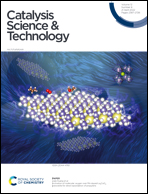CH4 steam reforming on Pt + Pd/Al2O3 monolith: impact of Mn0.5Fe2.5O4 spinel addition†
Abstract
The performance of Pt + Pd/Al2O3 monolith catalysts was analyzed under a feed (H2 + CO + CH4 + NO + O2 + H2O + CO2) simulating the exhaust gas of stoichiometric natural gas vehicles (NGVs). The flow reactor results show enhanced low temperature (<400 °C) CH4 oxidation activity under cyclic lean/rich feed modulation and with Mn0.5Fe2.5O4 (MFO) spinel addition to the platinum group metal (PGM) catalyst. In the absence of the MFO spinel, the PGM catalyst can achieve full CH4 conversion, but the presence of spinel in the catalyst limits the high temperature (>500 °C) CH4 conversion. The depletion of gas phase O2, as indicated by the detection of products CO and H2 in the reactor effluent at higher temperature and CH4 conversion, portends the emergence of steam reforming of CH4 (SRM). To investigate the cause of the detrimental impact of spinel under the high temperature, net rich regime, we show through a combination of SRM experiments and post-reaction catalyst characterization that SRM is negatively impacted by the accumulation of Mn and Fe spinel species on the PGM catalyst. This is due to the migration of the base metal species and potential encapsulation and blockage of PGM active sites. The latter is supported by density functional theory (DFT) calculations that indicate favorable metal oxide decoration of active Pt step sites. Finally, a zoned catalyst design is developed that mitigates the detrimental metals migration while exploiting the methane conversion enhancement afforded by spinel oxides under oxygen rich conditions.



 Please wait while we load your content...
Please wait while we load your content...